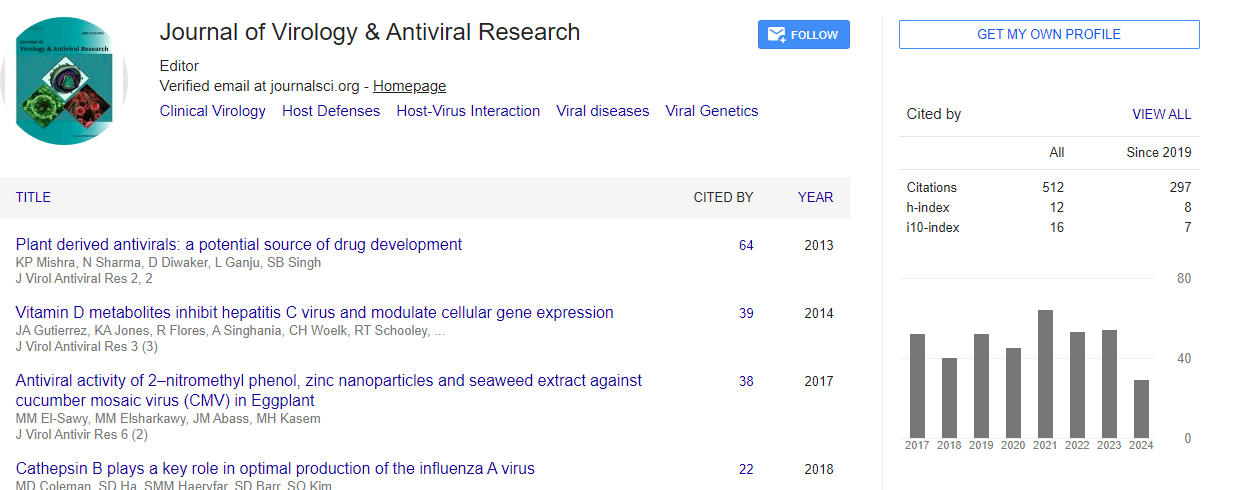Perspective, J Virol Antivir Res Vol: 13 Issue: 1
Proteomic Perspectives on Viral Infections: Insights into Pathogenesis and Therapeutic Targets
Yasuhiro Ishida*
1Department of Clinical Pharmacy, Shonan University of Medical Sciences, Kanagawa, Japan
*Corresponding Author: Yasuhiro Ishida,
Department of Clinical Pharmacy,
Shonan University of Medical Sciences, Kanagawa, Japan
E-mail: yasuhiro.ishida@sums.ac.jp
Received date: 26 February, 2024, Manuscript No. JVA-24-136885;
Editor assigned date: 28 February, 2024, PreQC No JVA-24-136885 (PQ);
Reviewed date: 14 March, 2024, QC No. JVA-24-136885;
Revised date: 22 March, 2024, Manuscript No. JVA-24-136885 (R);
Published date: 28 March, 2024, DOI: 10.4172/ 2324-8955.1000692
Citation: Ishida Y (2024) Proteomic Perspectives on Viral Infections: Insights into Pathogenesis and Therapeutic Targets. J Virol Antivir Res 13:1.
Description
Viral proteomics is a burgeoning field that delves into the intricate interplay between viruses and their host cells at the protein level. This study provides a comprehensive overview of viral proteomics, elucidating its significance in understanding viral pathogenesis, hostvirus interactions, and the discovery of potential therapeutic targets. By employing cutting-edge proteomic techniques, researchers can unravel the complex molecular networks underlying viral infections, paving the way for the development of novel antiviral strategies. This study discusses the latest advancements in viral proteomics, highlighting its potential applications in combating viral diseases and advancing precision medicine.
Viral infections pose significant threats to global public health, causing widespread morbidity and mortality. Traditional approaches to studying viruses have primarily focused on genomic and transcriptomic analyses. However, understanding the dynamic interplay between viruses and host cells requires a deeper exploration at the proteomic level. Viral proteomics offers a holistic view of the molecular mechanisms driving viral pathogenesis, host immune responses, and viral evasion strategies. This section introduces the concept of viral proteomics and outlines its relevance in combating viral diseases.
A myriad of proteomic techniques has been employed to dissect the complex proteome alterations induced by viral infections. This section provides an overview of key methodologies in viral proteomics, including mass spectrometry-based approaches, protein-protein interaction studies, and functional proteomics. Furthermore, emerging technologies such as single-cell proteomics and spatial proteomics hold immense potential in unravelling the spatial organization of viral proteins within host cells.
Viral proteomics has broad implications across various domains, ranging from fundamental virology to clinical applications. This section highlights the diverse applications of viral proteomics, including the identification of viral protein targets for drug development, elucidation of host-virus interactomes, and characterization of viral protein structures. Additionally, viral proteomics can inform vaccine development strategies by identifying antigenic targets and evaluating vaccine efficacy.
By dissecting the proteome dynamics during viral infections, researchers gain insights into the intricate mechanisms underlying viral pathogenesis. This section discusses how viral proteomics has unraveled the host factors exploited by viruses for replication, immune evasion strategies employed by viruses, and the dysregulation of host cellular processes induced by viral infections. Furthermore, viral proteomics facilitates the discovery of biomarkers for disease prognosis and monitoring viral progression.
The complex interplay between viruses and host cells is governed by a myriad of protein-protein interactions. Viral proteomics enables the systematic elucidation of host-virus interactomes, shedding light on the molecular crosstalk between viral proteins and host cellular machinery. This section explores how protein interaction networks identified through viral proteomics contribute to our understanding of viral pathogenesis and host immune responses.
One of the most promising applications of viral proteomics lies in the discovery of potential therapeutic targets for antiviral drug development. By identifying necessary viral proteins essential for viral replication or host factors attacked by viruses, researchers can design targeted therapeutic interventions to combat viral infections. This section discusses examples of viral protein targets identified through proteomic approaches and explores the challenges and opportunities in translating these findings into clinical therapeutics.
As viral proteomics continues to evolve, several challenges and future directions warrant consideration. This section discusses the potential avenues for advancing viral proteomics, including the integration of multi-omics data, development of high-throughput proteomic technologies, and application of artificial intelligence for data analysis. Additionally, ethical considerations surrounding the use of viral proteomics in research and clinical settings are addressed, emphasizing the importance of responsible data sharing and privacy protection.
Conclusion
Viral proteomics holds immense promise in unravelling the complex molecular mechanisms underlying viral infections and informing the development of targeted antiviral therapies. By leveraging cutting-edge proteomic technologies, researchers can gain unprecedented insights into viral pathogenesis, host-virus interactions, and therapeutic targets. Continued advancements in viral proteomics are poised to revolutionize our approach to combating viral diseases and improving global public health outcomes.
 Spanish
Spanish  Chinese
Chinese  Russian
Russian  German
German  French
French  Japanese
Japanese  Portuguese
Portuguese  Hindi
Hindi 

